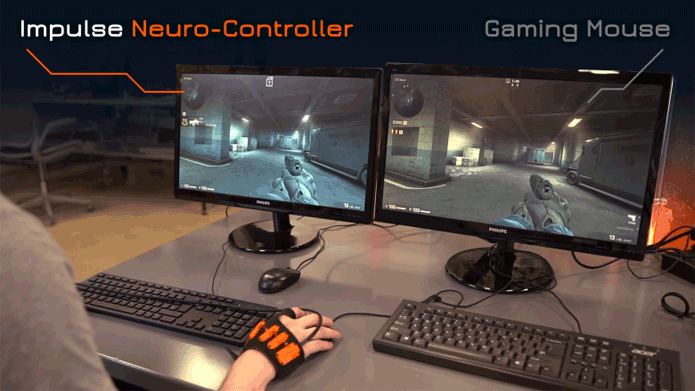George Will, a political commentator for nearly half a century at The Washington Post, is known to also enjoy weighing in on sports on occasion, most notably baseball. He is fond of repeating the simple but critical observation that these games are a matter of “seconds and inches.”
In digital games, the same maxim applies, but even more so. Fractions of inches matter when targeting the enemy. And critical time is not measured in seconds but in thousandths of seconds.
With that in mind, developers at Canadian startup Brink Bionics have developed a device that promises to boost gamer proficiency by slashing the delay time between an intent to act and execution of the actual action.
In fact, the Impulse Neuro-Controller essentially kicks into action from the moment the user merely thinks about acting.
The device is a fingerless glove with embedded sensors that detect the body’s naturally generated electrical impulses that precede actual muscle movement.
The sensors lie atop four muscles called the dorsal interossei that control finger movement. Generally, it takes about 150 milliseconds after a person thinks about moving a finger before movement begins. The Impulse Neuro-Controller detects the first instant of the impulse and can trim response time to the corresponding game movement to just 80 milliseconds.
Users begin by using the glove with a mouse but eventually can play games merely moving their fingers without the mouse underneath.
The three researchers who founded Brink Bionics all have experience working with prosthetic devices. Dr. Ning Jiang is a leading researcher in the development of advanced neural interfaces and is a recognized expert in the fields of non-invasive brain-computer interfaces. Dr. Jiayuan He is the author of 15 publications on myoelectric—relating to electrical properties of muscle movement—control systems for bionic arms. And Erik Lloyd, Brink CEO, has developed robotic devices and focuses on “neural interface technologies that can be used to enhance human performance for able-bodied users who want to exceed the limits of the human body,” according to a biographical sketch on the company web site.
The company’s promotional tagline cleverly sums up what the controller does: “Let your body impulses make your next move.”
Funding for the device was raised in crowdfunding campaigns on Kickstarter and Indiegogo. The Impulse Neuro-Controller promotional video was so popular that the company’s target goal was met in 12 hours.
Brink is putting the final touches on the devices and distribution is set to begin in April. Retail price is expected to be $169. The ongoing Indiegogo campaign is offering units to early adopters for $140.
The controller weighs about 1.5 ounces and can be used on any model mouse. For now, it’s compatible with Windows machines; it is not yet available for Mac systems.
While speedier response time will be appreciated by avid gamers who want to raise their scores, research has shown that digital game playing is not only fun but also helpful for human health and development. A research paper by Boston College Professor Peter Gray published in Psychology Today in 2015 asserted game playing may help players “develop logical, literary, executive and even social skills.”
According to Gray, there’s evidence that the fast actions and decision-making demanded by games create “lasting positive effects … on basic mental processes such as perception, attention, memory and decision-making.” Other benefits, he said, include “improved ability to engage in multiple tasks simultaneously, increased mental flexibility and reduction of mental decline that accompanies aging.”
PlayStation 5: DualShock 4 controllers will work for the console, but not for PS5 games
More information:
www.indiegogo.com/projects/imp … ller-for-pc-gaming#/
2021 Science X Network
Citation:
Impulse Neuro-Controller executes game moves with thoughts instead of mouse clicks (2021, January 14)
retrieved 14 January 2021
from https://techxplore.com/news/2021-01-impulse-neuro-controller-game-thoughts-mouse.html
This document is subject to copyright. Apart from any fair dealing for the purpose of private study or research, no
part may be reproduced without the written permission. The content is provided for information purposes only.



